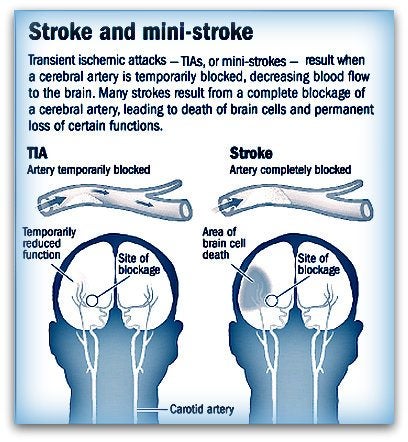TIA - Transient Ischemic Attack

A TIA is a blockage of a blood vessel in the brains, even causing a shut down. Usually by a tiny blood clotting. A TIA is a warning stroke, a mini-stroke, wherein the embolism (thrombus) in the artery is shutting down the brains of blood supply for a short period of time.
Once you have had a TIA, it increases the risk of a second stroke. TIA should be seen as a warning.
The failure may take a few minutes, but may also hold on for half an hour.
Someone with a TIA may have a hanging mouth or cannot speak properly. Sometimes he/she can not move his/her arm.
If you think someone has a TIA or stroke (both have the same symptoms), you can ask the person to lift his/her arm. Ask him/her to show the teeth or have him/her say anything. If this fails, you better call the emergency number.
The symptoms of a TIA usually occur rapidly and disappear quickly and the person will have no permanent injuries. Often the symptoms disappear after 20 minutes.
Yet a TIA is indeed dangerous, because it is sometimes followed by a stroke or cerebral infarction and that may have much more serious consequences than a TIA.
If the symptoms dissapear within 24 hours we speak of a TIA. If the symptoms lasts longer than 24 hour it is a stroke.
The limit of 24 was chosen quite arbitrarily. What matters is that a TIA is gone after a short time, while a stroke can last a longer period. Do you have residual symptoms then there is a cerebral infarction.
Coagulation-resistant medication and avoiding risks for an artery disease may make the risk of a second TIA considerably smaller. In some cases, treatment of a narrowed carotid artery may follow.
Dr Matarese director of a primary stroke center at St. Mary’s Medical Center in Langhorne, Pa. says: "While the vast majority of strokes are not preceded by TIA, about a third of people who experience TIA go on to have a stroke within a year. “TIA is a warning stroke and gives a patient time to act and keep a permanent stroke from occurring,” . “By recognizing TIA symptoms and getting to the hospital, the patient can get help in identifying why the TIA occurred and get treatment — either through medication or surgery — that can prevent a stroke from occurring.”
Causes of a TIA :
- arteriosclerosis
- arrhythmias
SEE TIA VIDEO WITH THIS LINK:
WHAT CAUSES ATHEROSCLEROSIS?
It is unknown exactly how atherosclerosis begins or what causes it. Some scientists think that certain risk factors may be associated with atherosclerosis, including:
-
Elevated cholesterol and triglyceride levels
-
High blood pressure
-
Smoking
-
Type 1 diabetes
-
Obesity
-
Physical inactivity
-
High saturated fat diet